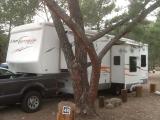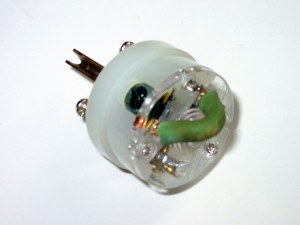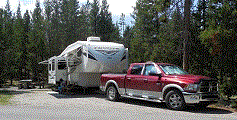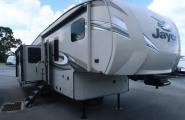|
View Poll Results: On which terminal should the the battery disconnect be on?
|
|
Positive terminal
|
   
|
4 |
50.00% |
|
Negative terminal
|
   
|
3 |
37.50% |
|
No idea
|
   
|
1 |
12.50% |
 |
|
 07-23-2015, 09:16 PM
07-23-2015, 09:16 PM
|
#41
|
|
New Camper
Join Date: Jul 2015
Location: Texas
Posts: 3
|
Debated on starting a new thread or not. I think I am just going to hop on this one instead. I have a '13 Hill Country 32BH. My battery was stolen and so the one I have in there now is not very good. Probably 10 years old. In preparation for our next trip I plugged the camper in to my 50 amp service at the house and fired everything up. A couple days later I removed the battery to use it on something else. I had my son reinstall it and he put it in backwards. Now I did not know he had done it until 2 days later I go in the trailer and its hot a fire inside and nothing works. I could not figure out why and never thought about the battery until I went to raise the tongue jack up and the controls were backwards. That made me look at the battery. I switched the wires around and then everything worked fine. A couple days later I go out and the battery is dead and everything is off again. I put the charger on the battery and once it hit about 50% the A/C came back on (yes I am still plugged into 50 amp service this whole time). So it runs no problem. Today I go out to hook up and running the tongue jack drains the battery to what the charger said was 0.2V. So I figured my battery is shot. During the process of the battery going down as the jack was going up the A/C cut off and all the lights dimmed out to the point that nothing worked. I ran up to Walmart and bought about the 2nd biggest battery they had (1 for a '13 Duramax) and hooked it up. Within about 10 seconds of connecting the power wire to the battery the A/C came back on. Now I know the A/C does not run off the battery but does the battery control some kind of converter or computer that controls the power? What other reason with the A/C not work without a charged battery?
Thanks for the input. Just want a little piece of mind driving down the road next week.
|

|

|
 07-23-2015, 09:28 PM
07-23-2015, 09:28 PM
|
#42
|
|
Family Vacation Member
Join Date: Mar 2014
Location: Iowa
Posts: 234
|
With a DC system the circuit can not be complete unless you touch both battery posts.
With AC the power is tied to earth ground by the power company.
__________________
2014 Z-1 ZT301BH--- Got hail damaged and been replaced.
2016 REZERVE RFZ-31BH
Reese Pro Series 16k hitch
2006 Chevy 2500HD 6.0L ext. Cab 8' bed.
|

|

|
 07-23-2015, 09:37 PM
07-23-2015, 09:37 PM
|
#43
|
|
Full Time Camper
Join Date: May 2011
Location: So. Cal.
Posts: 577
|
Quote:
Originally Posted by jakesz28

With a DC system the circuit can not be complete unless you touch both battery posts.
With AC the power is tied to earth ground by the power company.
|
What if you use a generator and don't have a power company?
__________________

Bob and Better Half
2007 F-250 PSD, SW, CC, LB, 2WD
2006 TF32SS Cross Terrain Toy Hauler (sold)
Reese 16k slider
|

|

|
 07-23-2015, 09:46 PM
07-23-2015, 09:46 PM
|
#44
|
|
Family Vacation Member
Join Date: Mar 2014
Location: Iowa
Posts: 234
|
I have not looked in the breaker panel on this rv. In all housing and industrial settings the neutral buss bars in all panels are tied to earth ground.
__________________
2014 Z-1 ZT301BH--- Got hail damaged and been replaced.
2016 REZERVE RFZ-31BH
Reese Pro Series 16k hitch
2006 Chevy 2500HD 6.0L ext. Cab 8' bed.
|

|

|
 07-23-2015, 09:47 PM
07-23-2015, 09:47 PM
|
#45
|
|
New Camper
Join Date: Jul 2015
Location: Texas
Posts: 3
|
Way o er my head there. So it needs the battery to complete the circuit?
|

|

|
 07-23-2015, 10:10 PM
07-23-2015, 10:10 PM
|
#46
|
|
Full Time Camper
Join Date: May 2011
Location: So. Cal.
Posts: 577
|
Quote:
Originally Posted by MAINEC

Debated on starting a new thread or not. I think I am just going to hop on this one instead. I have a '13 Hill Country 32BH. My battery was stolen and so the one I have in there now is not very good. Probably 10 years old. In preparation for our next trip I plugged the camper in to my 50 amp service at the house and fired everything up. A couple days later I removed the battery to use it on something else. I had my son reinstall it and he put it in backwards. Now I did not know he had done it until 2 days later I go in the trailer and its hot a fire inside and nothing works. I could not figure out why and never thought about the battery until I went to raise the tongue jack up and the controls were backwards. That made me look at the battery. I switched the wires around and then everything worked fine. A couple days later I go out and the battery is dead and everything is off again. I put the charger on the battery and once it hit about 50% the A/C came back on (yes I am still plugged into 50 amp service this whole time). So it runs no problem. Today I go out to hook up and running the tongue jack drains the battery to what the charger said was 0.2V. So I figured my battery is shot. During the process of the battery going down as the jack was going up the A/C cut off and all the lights dimmed out to the point that nothing worked. I ran up to Walmart and bought about the 2nd biggest battery they had (1 for a '13 Duramax) and hooked it up. Within about 10 seconds of connecting the power wire to the battery the A/C came back on. Now I know the A/C does not run off the battery but does the battery control some kind of converter or computer that controls the power? What other reason with the A/C not work without a charged battery?
Thanks for the input. Just want a little piece of mind driving down the road next week.
|
Mainec,
You probably have a switch box similar to one I've inserted below.
Without a good 12v source, the switch will not allow the ac to kick in and switch to the 120v and override the 12v. Hence, the ac won't be activated until the switch allows it. A good 12v source is paramount.
https://www.google.com/search?q=rv+s...Gkh_VHkB81M%3A
__________________

Bob and Better Half
2007 F-250 PSD, SW, CC, LB, 2WD
2006 TF32SS Cross Terrain Toy Hauler (sold)
Reese 16k slider
|

|

|
 07-24-2015, 02:37 AM
07-24-2015, 02:37 AM
|
#47
|
|
Full Time Camper
Join Date: Feb 2015
Location: SC
Posts: 679
|
In some units, 12VDC is used for thermostat wiring, and other control circuitry as well. Now is the time to watch for decaying DC voltage. It is very likely the reverse connection blew a couple of fuses in your converter. If that is true, the converter will not charge your new battery, and it too, will lose voltage over a couple of days. Unplug your 50 Amp AC connection, and measure voltage across battery. Should be around 12VDC. Then plug in your shore power, and voltage should jump up to the 13VDC range, indicating the converter is charging. If not, look for blown fuses.
__________________
Marty and Martha
2015 Z-1 211RD
2012 Nissan Titan
Dalzell SC
|

|

|
 07-24-2015, 06:03 AM
07-24-2015, 06:03 AM
|
#48
|
|
Site Team
Join Date: Dec 2007
Location: WI.
Posts: 9,161
|
Quote:
Originally Posted by r2millers

What if you use a generator and don't have a power company?
|
Quote:
Originally Posted by jakesz28

I have not looked in the breaker panel on this rv. In all housing and industrial settings the neutral buss bars in all panels are tied to earth ground.
|
In that case, I suggest you make up one of these.
 Generator Ground-Neutral Bonding | No~Shock~Zone
Generator Ground-Neutral Bonding | No~Shock~Zone
|

|

|
 07-24-2015, 07:45 AM
07-24-2015, 07:45 AM
|
#49
|
|
Family Vacation Member
Join Date: Mar 2014
Location: Iowa
Posts: 234
|
Quote:
Originally Posted by Lloyd

|
I read that article. I could not remember where but I thought the rv's were wired with a floating ground and that confirmed it. Thanks.
By code all pedistal AC power will have grounds and neatrals tied together. Never thought about how a generator was wired.
__________________
2014 Z-1 ZT301BH--- Got hail damaged and been replaced.
2016 REZERVE RFZ-31BH
Reese Pro Series 16k hitch
2006 Chevy 2500HD 6.0L ext. Cab 8' bed.
|

|

|
 07-24-2015, 08:19 AM
07-24-2015, 08:19 AM
|
#50
|
|
Family Vacation Member
Join Date: Jul 2011
Location: florida
Posts: 190
|
Had to make a plug for my generator now works great on rv .
__________________
2012 Ram 2500 CTD
2011 305skp fifthwheel

|

|

|
 07-24-2015, 09:44 AM
07-24-2015, 09:44 AM
|
#51
|
|
Full Time Camper
Join Date: May 2011
Location: So. Cal.
Posts: 577
|
Quote:
Originally Posted by MartyinSC

In some units, 12VDC is used for thermostat wiring, and other control circuitry as well. Now is the time to watch for decaying DC voltage. It is very likely the reverse connection blew a couple of fuses in your converter. If that is true, the converter will not charge your new battery, and it too, will lose voltage over a couple of days. Unplug your 50 Amp AC connection, and measure voltage across battery. Should be around 12VDC. Then plug in your shore power, and voltage should jump up to the 13VDC range, indicating the converter is charging. If not, look for blown fuses.
|
To Marty's point, if you're plugged into shore power and not seeing charging voltage at your terminals between 13.4-14.2v, your converter fuses probably are blown. Mine WCCO converter has two 35 amp fuses on the bottom of the unit.
Reversing polarity will usually blow these fuses.
A good battery should show between 12.6-12.8v static.
__________________

Bob and Better Half
2007 F-250 PSD, SW, CC, LB, 2WD
2006 TF32SS Cross Terrain Toy Hauler (sold)
Reese 16k slider
|

|

|
 07-24-2015, 12:31 PM
07-24-2015, 12:31 PM
|
#52
|
|
Full Time Camper
Join Date: Feb 2015
Location: SC
Posts: 679
|
Quote:
Originally Posted by Lloyd

|
Thanks Lloyd! This is great! I have a propane Champion model 76350, regular-type, not an inverter. I don't have fancy switchgear, but always plug my TT through a surge protector, the kind with the two green lights that indicate proper wiring. I get all kinds of error indicators when running on the generator, i.e. open ground, reverse polarity, etc. Though too new to be on that list, (the model numbers don't go up that far) a quick look at the generator's wiring diagram clearly shows the neutral (white) and chassis (green) are not bonded. I'm making my plug today! Great stuff!
__________________
Marty and Martha
2015 Z-1 211RD
2012 Nissan Titan
Dalzell SC
|

|

|
 08-07-2015, 01:48 PM
08-07-2015, 01:48 PM
|
#53
|
|
Site Team
Join Date: Sep 2012
Location: PA
Posts: 5,723
|
This is results of the poll: "On which terminal should the the battery disconnect be on?"
4 said on the positive terminal
3 said on the negative terminal
1 had no idea
Any others with input, feel free to post.
__________________
Mark & Susan
Lehighton, Pennsylvania

EAGLE HT FIFTH WHEEL | 30.5CKTS - '13 Ford F150 SCREW - PullRite Superslide - Roadmaster Active Suspension
Member - "Northeast Adventures RV Rally Group" & "Mason-Dixon Bunch" |

|

|
 05-09-2019, 08:59 PM
05-09-2019, 08:59 PM
|
#54
|
|
Weekend Camper
Join Date: Aug 2017
Location: IL
Posts: 17
|
I know this is an old thread but anyone coming here to look for some answers, I hope this helps.
The whole black white red thing goes like this.
The electrical code for a "dwelling" or mobile home will say that the groundED (not groundING in this case) shall be identified with white or grey coloring. This is the wire we would typically call the neutral. The "ground" we commonly refer to is the grounding conductor (green for grounding conductor). The neutral in your house is derived at the point of entry (electrical panel) and must be identified throughout the electrical system. Its also the larger spade on a typical plug without a ground. Because the negative of a 12 volt system is (almost) always grounded to the frame, it is also connected to grounding (or commonly just called "ground") when on shore power. So it becomes the grounded conductor, hence, it needs to be white.
Confusing, but I hope this helps some people identify wires and proper wiring techniques.
you should never switch the grounded conductor, especially on anything over 50 volts.
Hope this info helps those in any confusion!
|

|

|
 |
|
 Posting Rules
Posting Rules
|
You may not post new threads
You may not post replies
You may not post attachments
You may not edit your posts
HTML code is Off
|
|
|
|
 » Recent Threads
» Recent Threads |
|
|
|
|
|
|
|
|
|
|
|
|
|
|
|
|
|
|
|
|
|
|
|
|
|
|
|
|
|
|
|